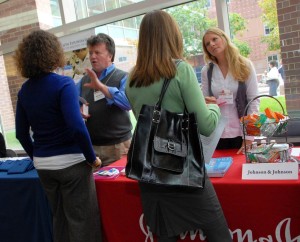By Peggy Curchack and Claire Klieger
In the recent blog post, What Am I Worth?, we offered our take on what constitutes reasonable monetary worth. Here we address “worth” from another angle. Now and again, we’ll get a question like this from a student:
“Shouldn’t I make more as a Marketing Assistant at BulgeBracket, Inc. than someone graduating from East Cupcake State? It was tougher for me to get in here and my classes are more difficult.”
 Over the years we’ve heard from Penn students who believe that their Ivy League education should automatically confer access to higher titles and/or higher starting salaries than graduates from less prestigious institutions. This would be like Emmy Nominees with degrees from Ivy League schools (Tony Shalhoub – Monk, Alec Baldwin – 30 Rock, Matthew Fox – Lost, Connie Britton – Friday Night Lights, and Michael C. Hall – Dexter) assuming that they were a shoe-in for the award because, “Hey, I went to _________!” Can you imagine Matthew Fox (Columbia) interrupting Bryan Cranston’s acceptance speech with an outburst of “This is an outrage! Didn’t anyone look at my transcript?”
Over the years we’ve heard from Penn students who believe that their Ivy League education should automatically confer access to higher titles and/or higher starting salaries than graduates from less prestigious institutions. This would be like Emmy Nominees with degrees from Ivy League schools (Tony Shalhoub – Monk, Alec Baldwin – 30 Rock, Matthew Fox – Lost, Connie Britton – Friday Night Lights, and Michael C. Hall – Dexter) assuming that they were a shoe-in for the award because, “Hey, I went to _________!” Can you imagine Matthew Fox (Columbia) interrupting Bryan Cranston’s acceptance speech with an outburst of “This is an outrage! Didn’t anyone look at my transcript?”
This mentality is likely to actually work against everything else you have going for you. Your Penn degree is worth a huge amount: it confers a lifelong identity in a select and highly-regarded community; it gives you access to options and opportunities for the rest of your life (including lifetime use of Career Services J); it opens doors that you probably haven’t even imagined yet.
But why should it mean that for the same work, at the same employer, you should be paid more?
Sure your Penn classes were really demanding – but were they all equally hard? The graduate of East Cupcake probably thinks that s/he worked really really hard for a 3.9 GPA, and s/he probably did! Throughout your career you’ll work side by side with — and probably report to — very smart, very hard-working people who did not graduate from schools with the prestige of Penn. Let’s take the Emmy’s again. One of the big winners of the night was Eddie Falco, a SUNY Purchase grad. It behooves us to respect everyone with whom we work, regardless of academic background.
There are so many things that your Penn education gives you that grads from the East Cupcake States of the world can’t count on. Just by seeing the Penn name on your resume, people will presume you’re well educated, have important critical skills, and can conduct yourself appropriately in professional situations. You also have access to alumni/ae networks of amazingly interesting people (most of whom will also get nostalgic about evenings at Smokey Joes, toast throwing at football games or late night debauchery in the Quad). The Penn degree will always confer status, but which of us likes having that flaunted? (Think about how you would feel if you every time you went to a party or sat next to someone on a plane they said, “Hi my name is ______ and I went to Harvard”).
And, from the ridiculous to the sublime, we leave you with Emily Dickinson’s take on this issue:
Tell all the Truth but tell it slant—
Success in Circuit lies
Too bright for our infirm Delight
The Truth’s superb surprise
As Lightening to the Children eased
With explanation kind
The Truth must dazzle gradually
Or every man be blind—



 and the people within the network know and trust them. The best time to network from a career perspective is when you are not actively looking for a job. You have more time, and you come across as less desperate. If you work hard to help people remember you by staying in contact, then you increase the likelihood that they’ll be thinking of you when future job opportunities arise. So, take time at career fairs to share your information with people in different career fields, think of creative ways to maintain contact with them over time to establish an effective relationship, and ask the most important question of all to gain access to their network: “Do you anyone you think I should talk with to find out more information?“
and the people within the network know and trust them. The best time to network from a career perspective is when you are not actively looking for a job. You have more time, and you come across as less desperate. If you work hard to help people remember you by staying in contact, then you increase the likelihood that they’ll be thinking of you when future job opportunities arise. So, take time at career fairs to share your information with people in different career fields, think of creative ways to maintain contact with them over time to establish an effective relationship, and ask the most important question of all to gain access to their network: “Do you anyone you think I should talk with to find out more information?“



